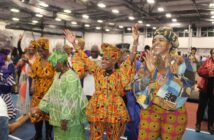As humans, we’re consistently learning and evolving—just like fashion and culture—as evident in this collaboration. Why is it so important to lean into history, culture and education as we continue to evolve as people, as a society and as a community?
Hardison: I want to answer that because I just came out of a very extraordinary experience. I recently attended Sundance Film Festival with my film Invisible Beauty. The interesting part of that excursion was to be in each one of those screenings and see that every audience was different. They can learn something and take away something they would have never been able to before viewing.
I believe that you come on this earth to sort of add to it. Even if you’re not necessarily the person who is changing the world on a grand scale, you should be listening and willing to support the people who are. That’s when you get someone like Ouiji, who is just called to just be. Because of this, you get swept up in that contagious energy, and that’s something different. It’s more than just fashion; it’s about learning.
Theodore: Everything that she’s saying I resonate with because no matter how powerful Ms. Hardison is, she’s still a student. This is what the campaign is about, “student power,” as my hat says.
People are seeing her as being so powerful. She’s done all of this stuff in fashion but is still a student. Fashion is what you’re seeing on the surface, but the essence of it is so much more. Yeah, we’re in the apparel business, and we get the chance to tell these stories but sometimes you get the chance to sit back and have to listen and learn about new stories.
If there was a specific era of fashion that you wish would live forever, what would it be?
Hardison: Oh, that’s funny. You know what? I like the classics but don’t know much about what people consider eras of fashion and stuff. As much as I grew up in it, I don’t keep up with it because I don’t create that nonsense. But I like the idea of just like the moment when we were rebels, radical and when we were thinking about the revolution. I like that moment. I like when people everybody looked similar because I do like uniforms. I like when everyone sort of looked like this was the moment and dressed with the same Afros. The Panthers wore bold black jackets. They were statements. It’s just sitting in your clothing, Ouigi. The clothes are just uniforms. I like that because it has such a cultural impact. That’s sustainability in itself.
Theodore: Me, personally, it’s not one particular era, but I love uniforms as well. I love repetition over time. I used to fantasize about living in the ’60s and during the Black Panther era. I realize that, living through George Floyd and Black Lives Matter, this is not fantasy—this is real. It happened in real-time then and it’s happening now in real-time. We have the opportunity to become, soldiers or pillars or a voice for change by utilizing our platforms and putting on the uniform to stand for what we believe in. So I’m a big fan of repetition, structure, and discipline, and whenever I get the chance to put that in my work and put that into my style, all over it.



